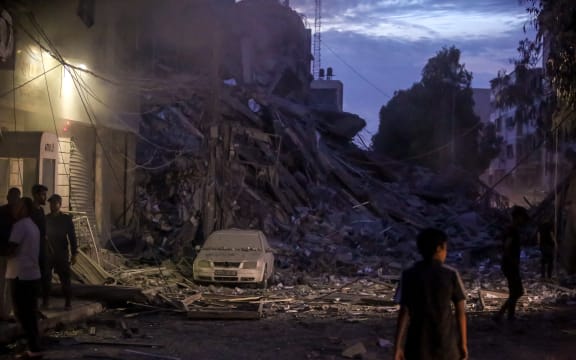A New Zealander living in Tel Aviv says one in 10 people he works with have already been called up to fight, and he fears his partner might soon have to join them.
More than 700 Israelis and 400 Palestinians are reported dead and many more injured in the latest round of fighting between Palestinian militants and Israel, the deadliest in decades.
Hamas, which rules the Gaza Strip and initiated the latest conflict, claims it is holding more than 100 hostages - including Israeli army officers.
Israel has declared formally in a state of war for the first time since 1973.
"So many, many people have, are being called up," Jordan Grimmer, a Kiwi living in Tel Aviv, told Checkpoint on Monday.
"I have a large number of friends and colleagues, I think around 10 percent of my workplace has already been called up on reserve duty.
"My husband hasn't received a call yet, but it's something that's on the cards. It's a very nervous feeling that this is a possibility."
Tel Aviv, one of Israel's largest cities, has been hit by rockets launched from Gaza. Grimmer said despite this, it was not in a state of lockdown.

A Palestinian boy standing in front of the wreckage left after Israeli air strikes destroyed this 14-storey residential tower in the Al-Rimal neighborhood of Gaza City. Photo: AFP/ Mohammed Dahman
"Although when you go out into the streets, they've been absolutely deserted. Mostly just a few people out there walking their dogs, and I think that is mostly because people are very scared of the rockets that have been hitting the city or have been reaching the city before being intercepted by the Iron Dome.
"People want to stay close to where they know there is a bomb shelter, and so when you're out in the streets, you're not sure where that will be."
Generally, residents had about 90 seconds' warning of incoming rockets, he said. The building he lived in was quite old and did not have a bomb shelter - they had to use one across the road beneath an addiction treatment centre.
"It's terrifying. It's not a fun experience at all. Often you'll be there with older people and young children and babies, so everyone kind of has to try and put on a brave face to keep everyone feeling calm… but it's not easy, and especially when it's happening late at night and everyone's wearing their pyjamas."
He said most of the discussion in the media at present was about the hostages, but "after the dust settles, there will have to be hard questions to be asked about how this could occur".
Otherwise for now, the country was feeling "just absolute kind of disgust and shock, especially some of the footage that has been circulating on social media - people being massacred at music festivals, old women and young toddlers being taken hostage.
"It's been really galling and just I don't, I don't even really have words to describe it. I mean, I think Saturday… had the largest number of Jewish people killed in one day since the Holocaust, and so that's been a psychic shock to the people here that something like that could happen."
Grimmer said he never expected to be considering the possibility someone in his immediate family might have to go to war. Israel has conscription, with many citizens required to serve a couple of years in the military and be available for reserve duty up to the age of 40.
"People here are resilient and they're able to kind of cope with really difficult situations, but it's still, it's still very awful."

